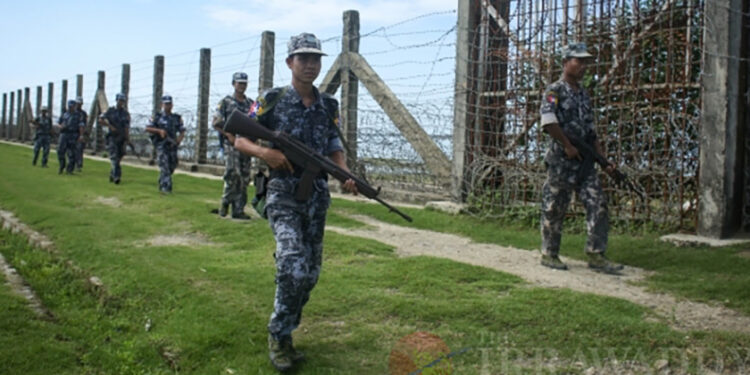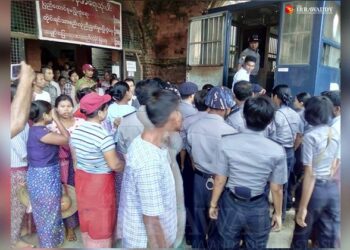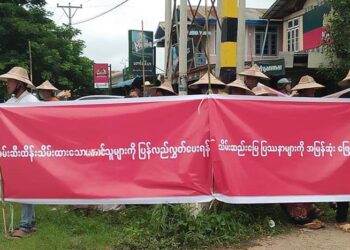YANGON – The border police force in northern Rakhine State’s Buthidaung township is preparing to build a new regimental base on nearly 600 acres of farmland that belonged to Rohingya residents of Ale Chaung village, sources confirmed to The Irrawaddy on Friday.
At least two police majors verified the controversial project. One is based in Maungdaw district, while the other, who is now stationed in Yangon, had served in the border police force for many years. The officers declined to provide specific information about the project as it is being overseen by high-ranking officials.
A Muslim civil servant from Buthidaung, U Tun Thar (name changed to protect his identity), explained that Ale Chaung village is a 15-minute drive from downtown Buthidaung and located near the under-construction Buthidaung-Nyaung Chaung Highway.
The village, consisting of about 700 homes, was spared from arson attacks during the clashes between the Arakan Rohingya Salvation Army (ARSA) and government security forces in late 2017 – which ultimately resulted in 650,000 Rohingya fleeing to Bangladesh— although nearly half of the families in the village have since joined the mass exodus, U Tun Thar said.
The Irrawaddy couldn’t independently confirm whether the border police had legally acquired the farmland for the new regimental base.
Another displaced person, Abdul Wahid from Rathedaung township, who is currently sheltering with his relatives in Buthidaung Township, said the authorities had planted flags designating the area as the site of new compound a few days ago and issued verbal warnings to villagers not to trespass or let their cattle graze on the land.
Some paddy fields have not been harvested as they lie within the area that has been seized.
The site of the new police base and Ale Chaung village are flanked by the Buthidaung-Nyaung Chaung Highway. Some bulldozers and dump trucks have already arrived at the site and are parked near a newly constructed warehouse. Several hundred Ale Chaung residents have left their homes as they are concerned about being detained by the police in coming weeks.
“Homes were not set alight by police here but villagers are frightened of them and that’s the main reason why they fled the village,” U Tun Thar said.
Between Jan. 5 to Feb. 15, the Ministry of Home Affairs issued 24 updates on the number of Rohingya who have encamped near the Gawdu Thara shore of southern Maungdaw. However, the police reports were primarily focused on the number of new arrivals and identified the home towns of the fleeing villagers only four times — on Jan 5 and 29, and Feb 4 and 12.
According to a Home Affairs Ministry update on Jan 5, 504 Rohingya from 12 villages in Buthidaung and others from two villages in Rathedaung Township had arrived at Gawdu Thara. Most of these villages neighbor Ale Chaung.
On Jan. 29, the police reported that 853 people from 12 villages in Buthidaung had arrived at the Gawadu Thara seaside. Ale Chaung was among the list of villages but the police report did not provide further deails.
On Feb 4, 788 Muslims from 16 villages in Buthidaung reached Gawdu Thara although again the police statement did not elaborate further. On Feb 12, 868 residents from 16 villages of the Buthidaung arrived in Gawdu Thara and Ale Chaung villagers were among them although their number was not made specified in the police report.
Rathedaung Muslim sources confirmed to The Irrawaddy that most of the hamlets mentioned in the police reports are neighboring villages of Ale Chaung.
In a bid to get more information about the plan to establish a new police regiment in the strife-torn region, The Irrawaddy phoned Rakhine State Chief Police Col. Aung Myat Moe and Border Affairs Minister Col. Phone Tint several times on Friday but failed to reach them.












